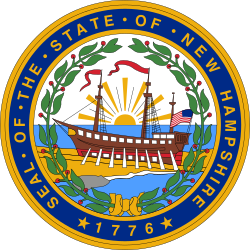February 24, 1976 | |||||||||||||||||||
| |||||||||||||||||||
 County results Ford: 50-60% 60-70% Reagan: 50-60% | |||||||||||||||||||
| Elections in New Hampshire |
|---|
 |
The 1976 New Hampshire Republican presidential primary was held on February 24, 1976, in New Hampshire as one of the Republican Party's statewide nomination contests ahead of the 1976 United States presidential election. Incumbent President Gerald Ford eked out a razor-thin victory over the more conservative Ronald Reagan by just 1,587 votes, or 1.5 percentage points. [1] [2] Ford would go on to win the nomination at the contested 1976 Republican convention, [3] but lost to Jimmy Carter in the general election.
| Counties | Ford | Reagan | Other | Total | |||
|---|---|---|---|---|---|---|---|
| # | % | # | % | # | % | ||
| Belknap | 3,001 | 45.3% | 3,442 | 52.0% | 178 | 2.7% | 6,621 |
| Carroll | 2,834 | 47.7% | 3,031 | 51.0% | 82 | 1.4% | 5,947 |
| Cheshike | 5,017 | 59.9% | 3,095 | 37.0% | 258 | 3.1% | 8,370 |
| Coos | 1,745 | 40.6% | 2,448 | 57.0% | 101 | 2.4% | 4,294 |
| Grafton | 4,910 | 50.4% | 4,591 | 47.2% | 233 | 2.4% | 9,734 |
| Hillsborough | 11,379 | 43.5% | 14,114 | 53.9% | 678 | 2.6% | 26,171 |
| Merrimack | 8,111 | 52.8% | 6,884 | 44.8% | 378 | 2.5% | 15,373 |
| Rockingham | 11,314 | 50.2% | 10,604 | 47.0% | 632 | 2.8% | 22,550 |
| Strafford | 3,436 | 55.7% | 3,436 | 41.3% | 248 | 3.0% | 8,312 |
| Sullivan | 1,924 | 51.5% | 1,924 | 44.7% | 164 | 3.8% | 4,305 |
| Total | 55,156 | 49.4% | 53,569 | 48.0% | 2,952 | 2.6% | 111,677 |

